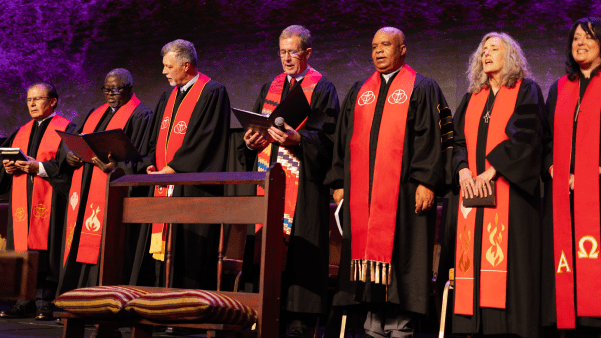One of the most influential and controversial events in the twentieth-century American church was the emergence of the charismatic movement. With its emphasis on the gifts of the Spirit, the movement brought elements of Pentecostalism to non-Pentecostal churches. By the early 1960s, Catholics, mainline churches, and many non-Pentecostal evangelicals were experiencing the power of the Holy Spirit through prophecies, divine healings, speaking in tongues, and various physical phenomena. The movement generated much debate about the purpose of these gifts and experiences in the Christian life. Were they legitimate expressions of worship, or just frenzied spiritual emotionalism?

The phenomenon of tongues (or glossolalia) is identified by many as the supernatural utterance of foreign human languages (Acts 2:4,6); others contend that it includes speaking an angelic language (1 Corinthians 13:1) or some other verbal expression requiring interpretation (1 Corinthians 14). For many years, speaking in tongues was seen as the distinguishing characteristic of the Pentecostal and charismatic traditions within the church. Some Pentecostal Christians, in particular, laid heavy emphasis on speaking in tongues as “initial evidence” of baptism in the Spirit.
That there was some connection in the scriptural record between baptism in the Holy Spirit and speaking in tongues is apparent from at least two passages in Acts. First, recall Acts 1 and 2. Jesus told his disciples that, though John baptized with water, they would be baptized with the Holy Spirit (1:5). Several days later in Jerusalem, Jesus’ promise came to pass: “They were all filled with the Holy Spirit” (2:4, NAS). “Baptizing” and “filling” seemed to refer to the same experience. Immediately thereafter they “began to speak with other tongues.”
A second example is found in Acts 10 and 11. Peter had been preaching the gospel to Gentiles in Caesarea when suddenly “the Holy Spirit fell upon all who were listening to the message” and “they [Peter and those with him] were hearing them speaking with tongues and exalting God” (10:44-46). Peter later identified this experience as being “baptized with the Holy Spirit” (11:15-16).
We do well to note the significance in Acts of baptism in the Holy Spirit. Immediately following the Pentecost event, Peter declared, “This is what was spoken of through the prophet Joel: ‘And it shall be in the last days, God says, that I will pour forth of My Spirit upon all mankind.'” After the similar event at Caesarea, the Scripture states, “The gift of the Holy Spirit had been poured out upon the Gentiles also.”
Speaking in tongues seemed to proceed from the abundance of the gift of the Holy Spirit. Tongues were the outward and audible expression of this abundance. Moreover, these tongues, whether spoken in Jerusalem or Caesarea, were in praise of God and primarily directed to God. As Paul was later to say, “One who speaks in a tongue does not speak to men, but to God” (1 Corinthians 14:2).
Countless numbers of believers today testify that they too have been baptized in the Holy Spirit and spoken in tongues. They see themselves as standing in the line of Jerusalem and Caesarea (and, later, —Acts 19:6). For them, speaking in tongues is not so much “proof” as it is supernatural evidence of the Holy Spirit’s powerful presence and activity.
So, “Are those who haven’t spoken in tongues without the Holy Spirit?” Only those who have the Holy Spirit can truly speak in tongues. To be a Christian is to be indwelt by the Holy Spirit (Romans 8:11), whether one speaks in tongues or not. Indeed, many believers in Christ, including those from Pentecostal and charismatic traditions, have never spoken in tongues.
For many believers, speaking in tongues continues to be an evidence of the Holy Spirit’s presence. There are, however, many other evidences of the Spirit’s activity: the other gifts of the Holy Spirit (1 Corinthians 12:8-10) and, most important, the expression of the fruit of the Spirit—love, joy, peace, patience, kindness, goodness, faithfulness, gentleness, and self-control (Gal. 5:22-23). The church in our time needs a healthy balance of all these evidences.
J. Rodman Williams is professor of theology at Regent University and the author of Renewal Theology: Systematic Theology from a Charismatic Perspective (Zondervan).
Related Elsewhere
J. Rodman Williams’s site at Regent University offers information about the professor and his works, and has many of his writings available online.
CBN also has a site for Williams and his writings.
For the history of how speaking in tongues became so important to the Pentecostal movement, see Christian History‘s Issue 58: “The Rise of Pentecostalism,” particularly “American Pentecost” and “Pentecostalism’s Global Language.”
Christian History looks again at Pentecostalism’s founding in its current issue on the “10 Most Influential Christians of the Twentieth Century.”
Earlier “Good Question” columns include:
- Did Jesus Really Descend to Hell?
- Take, Eat-But How Often?
- Is Christmas Pagan?
- Are Christians Required to Tithe?
- Is Revelation Prophecy or History?
- You’re Divorced-Can You Remarry?
- If Grace Is Irresistible, Why Evangelize?
- If I’m an Evangelical, What Am I?
- A Cracked Code
- Committing the Unforgivable Sin
- What Bible Version Did Jesus Read?
- Did God Die on the Cross?
- You Must Be Born Again-but at What Age?
- Was the Revolutionary War Justified?
- Can the Dead Be Converted?
- Cloaked in Mystery
- Is Hell Forever?
- Denominations: Divided We Stand
- Did Paul Baptize for the Dead?
- Do Demons Have Zip Codes?
- Doubting Thomas’s Gospel
Copyright © 2000 Christianity Today. Click for reprint information.











